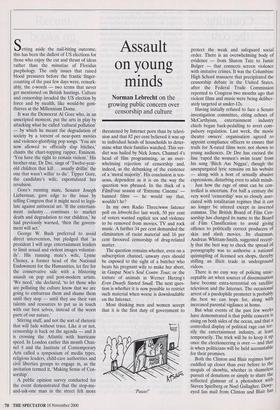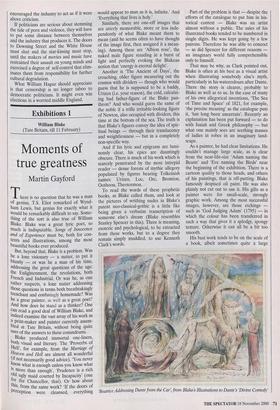Assault on young minds
Norman Lebrecht on the growing public concern over censorship and culture Setting aside the nail-biting outcome, this has been the dullest of US elections for those who enjoy the cut and thrust of ideas rather than the minutiae of Floridan psephology. The only issues that raised blood pressures before the frantic finger- counting of the past few days were, remark- ably, the c-words — two terms that never get mentioned on British hustings. Culture and censorship invaded the US election by force and by stealth, like would-be gem- thieves at the Millennium Dome.
It was the Democrat Al Gore who, in an unscripted moment, put the arts in play by attacking what he called 'cultural pollution' — by which he meant the degradation of society by a torrent of near-porn movies and violence-glorifying pop songs. 'You are now allowed to officially slap bitches,' chants the chart-topping rapper, Eminem. `You have the right to remain violent.' His brother-star, Dr Dre, sings of Twelve-year- old children that kill ... usually drillin' the one that wasn't willin' to die'. Tipper Gore, the candidate's wife, expostulated her revulsion.
Gore's running mate, Senator Joseph Lieberman, gave edge to the issue by telling Congress that it might need to legis- late against antisocial art. 'If the entertain- ment industry ... continues to market death and degradation to our children,' he had previously warned, 'then the govern- ment will act.'
George W. Bush preferred to avoid direct intervention, but pledged that 'as president I will urge entertainment leaders to limit sexual and violent images voluntar- ily'. His running mate's wife, Lynne Cheney, a former head of the National Endowment for the Humanities, let fire for the conservative side with a blistering assault on pop and post-modern artists. `We need,' she declared, `to let those who are polluting the culture know that we are going to embarrass them and shame them until they stop — until they use their vast talents and resources to put us in touch with our best selves, instead of the worst parts of our nature.'
Stirring stuff, and not the sort of rhetoric that will fade without trace. Like it or not, censorship is back on the agenda — and it is crossing the Atlantic with hurricane speed. In London earlier this month Chan- nel 4 and the Institute of Contemporary Arts called a symposium of media types, religious leaders, child-care authorities and civil liberties groups to engage in, as the invitation termed it, 'Making Sense of Cen- sorship'.
A public opinion survey conducted for the event demonstrated that the stop-me- and-ask-one man in the street felt more threatened by Internet porn than by televi- sion and that 82 per cent believed it was up to individual heads of households to deter- mine what their families watched. This ver- dict was hailed by Nick Jones, Channel 4's head of film programming, as an over- whelming rejection of censorship and, indeed, as the debunking of the existence of a 'moral majority'. His conclusion is ten- uous, dependent as it is on the way the question was phrased. In the thick of a FilmFour season of 'Extreme Cinema' banned films — he would say that, wouldn't he?
In my own Radio Three/www listener poll on lebrecht.live last week, 50 per cent of voters wanted explicit sex and violence to be removed from movies, TV and rock music. A further 34 per cent demanded the elimination of racist material and 16 per cent favoured censorship of drug-related matter.
The question remains whether, even on a subscription channel, unwary eyes should be exposed to the sight of a butcher who beats his pregnant wife to make her abort, in Gaspar Noe's Seul Contre Tous; or the torture of animals in Werner Herzog's Even Dwarfs Started Small. The next ques- tion is whether it is now possible to restrict such material when worse is downloadable on the Internet.
Most thinking men and women accept that it is the first duty of government to `Pause!' protect the weak and safeguard social order. There is an overwhelming body of evidence — from Sharon Tate to Jamie Bulger — that connects screen violence with imitative crimes. It was the Columbine High School massacre that precipitated the censorship debate in the United States, after the Federal Trade Commission reported to Congress two months ago that violent films and music were being deliber- ately targeted at under-12s.
Having initially refused to face a Senate investigation committee, citing echoes of McCarthyism, entertainment industry chiefs began back-pedalling to avert com- pulsory regulation. Last week, the movie theatre owners' organisation agreed to appoint compliance officers to ensure that trails for X-rated films were not shown to young audiences. Dr Dre has excised the line 'raped the women's swim team' from his song 'Bitch Ass Niggaz', though the unexpurgated lyric remains on his website — along with a host of sexually abusive expressions, disturbing even to adult minds.
Just how the rage of smut can be con- trolled is uncertain. For half a century the very word 'censorship' was so closely asso- ciated with totalitarian regimes that it can no longer be uttered except in inverted commas. The British Board of Film Cen- sorship has changed its name to the Board of Film Classification to avoid giving offence to politically correct producers of skin and slash movies. Its chairman, Andreas Whittam-Smith, suggested recent- ly that the best way to check the spread of pornography was to authorise a national quintupling of licensed sex shops, thereby stifling an illicit trade in underground videos.
There is no easy way of policing unac- ceptable art when sources of dissemination have become extra-terrestrial on satellite television and the Internet. The occasional arrest of a paedophile promoter is probably the best we can hope for, along with increased parental vigilance at home.
But what events of the past few weeks have demonstrated is that public concern is rising on both sides of the ocean, and that a controlled display of political rage can ter- rify the entertainment industry, at least temporarily. The trick will be to keep it up once the electioneering is over — and that is when politicians will be held accountable for their promises.
Both the Clinton and Blair regimes have cuddled up closer than ever before to the moguls of showbiz, whether in shameless pursuit of donations or simply to share the reflected glamour of a photoshoot with Steven Spielberg or Noel Gallagher. Dewy- eyed fan mail from Clinton and Blair has encouraged the industry to act as if it were above criticism.
If politicians are serious about stemming the tide of porn and violence, they will have to put some distance between themselves and the industry that produces it. The doors to Downing Street and the White House must shut and the star-kissing must stop, until the makers of movies and music have restrained their assault on young minds and exercised a degree of self-control that elim- mates them from responsibility for further cultural degradation. What William Hague should appreciate is that censorship is no longer taboo to democratic politicians. It might even win elections in a worried middle England.



































































































 Previous page
Previous page